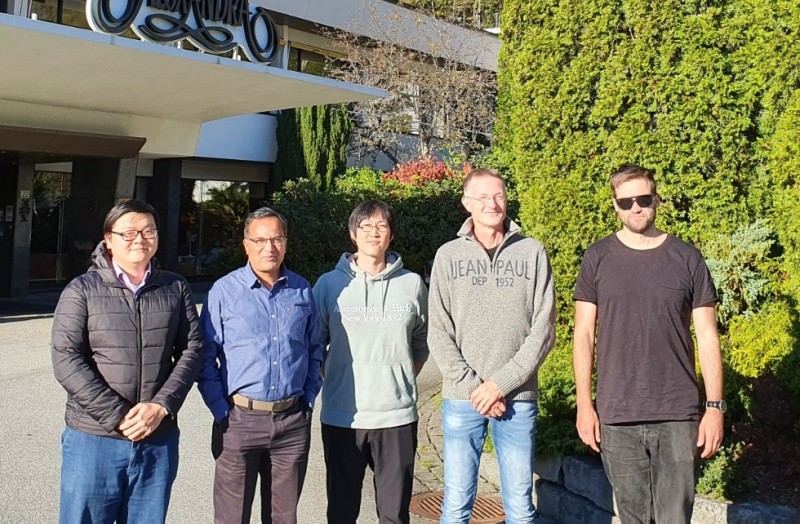Fake news to be studied in new, international big data project

Identifying and exposing fake news and online hate speech is to be a research topic in a new, international collaboration project within big data. Western Norway Research Institute will be cooperating with colleagues in India, Japan, China, Hong Kong, and the USA. The top researchers taking part in this project will be sharing knowledge as well as research methods, in addition to including students in their ongoing research.
In spite of the restrictions caused by the coronavirus pandemic, the big data research group at Western Norway Research Institute (WNRI) are launching a new project based on mobility and international collaboration in big data research.
"Although Covid-19 renders a lot of our plans somewhat uncertain, we hope to be able to organise seminars, workshops, guest lectures, and research exchanges", says the Rajendra Akerkar, who coordinates the new project. As a professor and senior researcher at WNRI, he has led the institute's big data research for several years – i.e. research on large and complex data sets that may, through advanced processing and analysis, be utilized in various realms of society.
Detecting fake news and online hate speech
One of the research topics that will be covered by the new project, is how fake news and online hate speech can be detected and exposed through improving the methods available. As an example, automatic analysis of the sender's features could help the system decide whether or not he appears to be suspect.
The set of criteria could include indicators such as followers: What characterises the followers of the profile which spreads such contents, and are these followers genuine or fake?
"There is a growing interest in detecting various forms of online hate speech – including, for example, online bullying and fake news intended to diminish a specific minority", says Akerkar. In this project, he and his fellow project participants will examine the «villains» of this realm.
"We aim at further development of existing methods for automatic detection of this type of online activity", the professor explains.
Possible through excellence and EU projects
For seven years, the big data research group has led and carried out several research projects funded by the European Commission. These merits allowed Akerkar and his colleagues to apply for funding from the INTPART programme administered by the Research Council of Norway and the Norwegian Agency for International Cooperation and Quality Enhancement in Higher Education (Diku). INTPART is intended to support researchers in Norway in their efforts to establish, build, and maintain «strategic partnerships of excellent quality» with researchers in selected countries.
This particular INTPART project, the second one in the recent history of the institute, involves partners in India, Japan, China, Hong Kong, and the USA in addition to the lead partner, WNRI, and Western Norway University of Applied Sciences (HVL).
Different areas of expertise
One of the Japanese partners is the premier Informatics institute in Japan; the other one - the University of Tokyo - is already engaged in formal cooperation with the Chinese university in the project.
The Indian partner, IIT Indore, is one of India's 23 state-funded technology institutes, where gifted students compete to be awarded scholarships for further studies at American universities such as George Mason and San Diego State.
"The Indians in the collaboration project are at the forefront in research on the Internet of Things (IoT), i.e. technology for linking objects together and operating them through a network", Akerkar explains.
Fake news and floods
Big data, social media, and artificial intelligence all belong to the category "disruptive technology", i.e. innovations that significantly alter the way that consumers, industries, or businesses operate. The label is common to all the research that is to be carried out in the project.
Another key concept related to the big data research in question is resilience, which in this context refers to the ability of a system or individual to handle risks of a significant extent. Rajendra Akerkar and his colleagues are working on resilience in relation to both infrastructure, organisations, and communities.
"This is why our research involves topics ranging from fake news to flooding events", says Akerkar.
Learning from crises
During events such a serious flooding incident in populated areas, e.g. the flood that afflicted Odda and Flåm in 2014, entail great activity in terms of communication and data traffic, which is why big data researchers take a keen interest in extracting data from time periods involving such situations. These data sets provide useful insight into the nature of such crises and how they evolve.
In previous projects, the big data researchers at WNRI have examined how government bodies and other public stakeholders could learn from or gain insight into crisis management in new ways. Big data for such purposes could be collected from sources such as meteorology, social media, various sensors, and traffic systems.
"Gaining experience from digital sources may be of great use to those making decisions about the future of preparedness, such as directorates and other state agencies", says Akerkar.
The project coordinator looks forward to continuing to develop these research topics in collaboration with the international partners.
"Several research processes to solve various problems are ongoing in our field of research. The INTPART funding provides us with an opportunity to learn from each other and build new competence, whilst offering students a glimpse of the research front, says Akerkar.
The formal title of the new collaboration project is Transnational Partnership for Excellent Research and Education in Disruptive Technologies for a Resilient Future. The project runs from October 2020.


